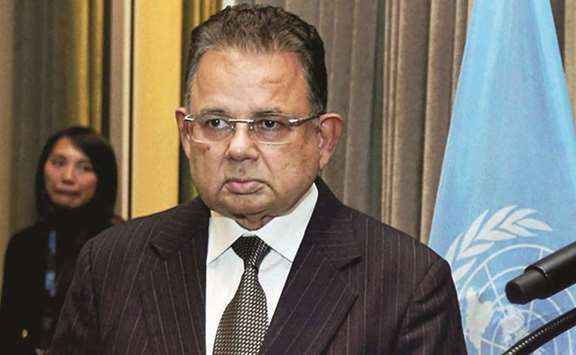“I am grateful to all the nations who have supported me,” Bhandari said in the Assembly chamber after the election on Monday. “It was a big election as you know.”
Prime Minister Narendra Modi yesterday congratulated Bhandari “on being re-elected to the International Court of Justice. His re-election is a proud moment for us”.
Modi also congratulated External Affairs Minister Sushma Swaraj and her department’s “untiring efforts” for India’s win.
Following Bhandari’s election, Swaraj tweeted: “Vande Mataram – India wins election.” She added: “Huge efforts by Team MEA.” She specifically complimented India’s Permanent Representative in the UN, Syed Akbaruddin.
Bhandari will start his term from next February.
The withdrawal of its candidate by Britain, which had the backing of its fellow permanent members, was a setback for the Security Council that had been locked in a test of wills with the Assembly.
A candidate has to win a majority in both chambers. Bhandari won majorities in the Assembly in the first 11 rounds of voting over two meetings while the Council blocked his election by giving majorities to Greenwood in the 10 rounds of balloting it held.
“The British ultimately had to bow down to the will of the majority,” a diplomat said. “The Indians stared them down.”
The Council’s permanent members have traditionally had a judge in the ICJ, assuming it to be a matter of right. This time the 193-member Assembly asserted itself, forcing the Council to back down and put at risk the continuation of the ICJ perk of the permanent members.
In letters written to the Presidents Miroslav Lajcak of the Assembly and Sebastiano Cardi of the Council, Britain’s Permanent Representative Matthew Rycroft said his country was withdrawing Greenwood’s candidature keeping “in mind the close relationship that the UK and India always enjoyed and will continue to enjoy”.
Bhandari’s election was a dramatic face-saving turn of fortunes for India as he lost the Asian seat on the ICJ to Lebanese lawyer-turned-diplomat Nawaf Salam, who had been campaigning for two years and had the backing of the Organisation of Islamic Co-operation with 55 UN members.
Bhandari got a second chance only because an unpopular Britain could not get an Assembly majority for a remaining judgeship requiring a runoff where the two chambers of the UN split in their voting.
In the last round of voting on November 13, Bhandari received 121 votes, just short of a two-thirds majority in the 193-member Assembly, while Greenwood received nine in the Council.
“The precedent is clear,” Akbaruddin said at a reception for Bhandari attended by representatives of over 160 countries.
“As is expected in the 21st century, the candidate who enjoys overwhelming support of the General Assembly membership can be the only legitimate candidate to go through.”
Diplomats familiar with behind-the-scenes manoeuvres said Britain indicated late last week that it would withdraw Greenwood, but over the weekend changed course with the backing of some fellow permanent members and came up with a plan for the Council to call for ending the balloting and set up a joint conference to resolve the deadlock.

